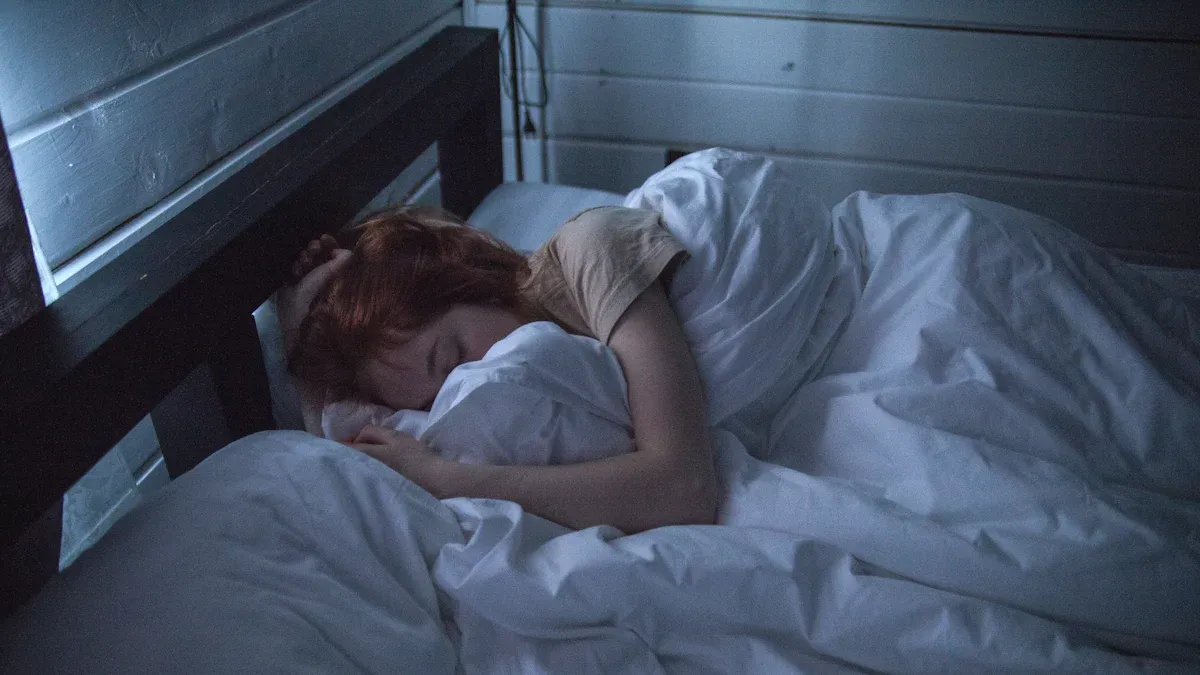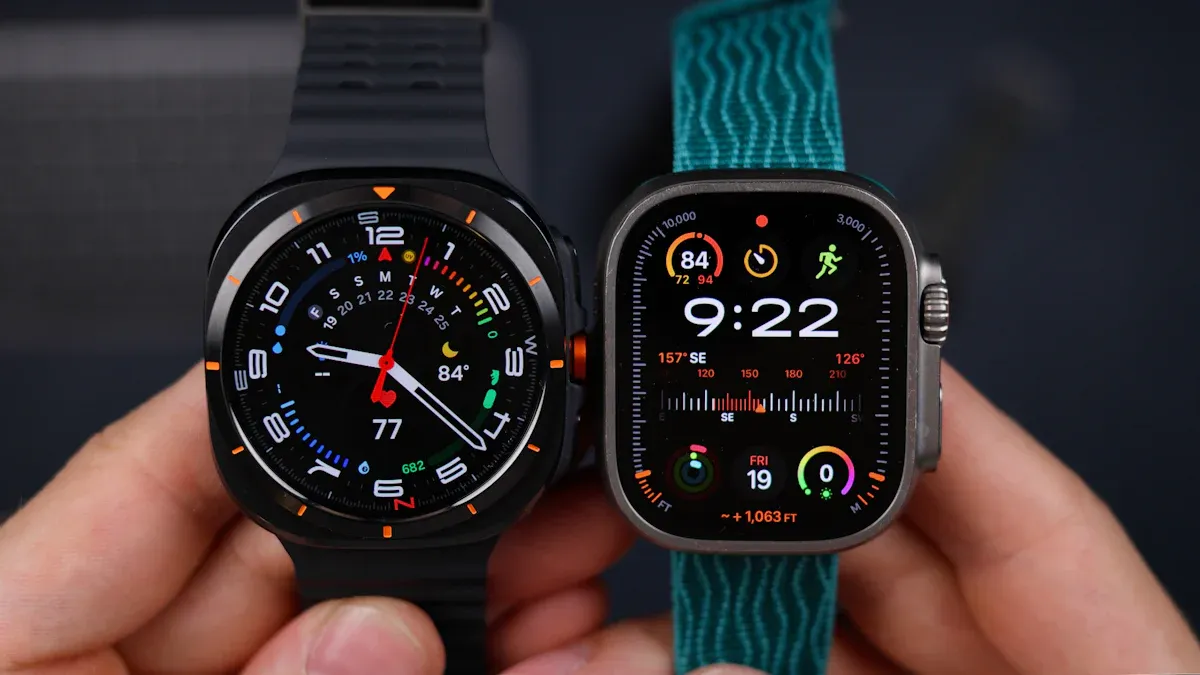
Tracking sleep is now important for better health and wellness. Many adults have trouble sleeping well, with most people sleeping less than seven hours a night. Over one-third of adults around the world suffer from insomnia, and two-thirds report having problems sleeping every night. These issues can lead to health complications like diabetes and high blood pressure, as well as memory problems. About 80% of adults desire to sleep better. Tools like the top rated sleep tracker of 2025 can help you monitor and enhance your sleep quality.
Key Takeaways
-
Sleep trackers help you sleep better by checking your sleep time and stages.
-
Pick a tracker that fits your needs, like price, fitness tools, or special features.
-
Find trackers with apps that make it easy to see your sleep and health info.
-
Choose one that feels comfy and has a long-lasting battery for nightly use.
-
Tracking sleep well can make you healthier, recover faster, and feel less tired.
Key Takeaways from the Best Wearable Sleep Trackers
Best overall sleep tracker of 2025
The best overall sleep tracker of 2025 is accurate and comfortable. It has advanced features to help track your sleep better. Devices like the Fibion Helix are great for tracking sleep stages and heart rate. They also measure how long you sleep. These features give you a clear picture of your sleep habits. Unlike others like ActiGraph LEAP and GENEActiv, the Fibion Helix offers raw data access. It also has an SDK, which is useful for tech-savvy people.
A study by Brigham and Women’s Hospital praises the Oura Ring. It is excellent at identifying sleep stages. This helps improve your sleep quality. With these choices, you can pick a tracker that suits your needs.
Most accurate sleep tracking device
Accuracy matters when picking a sleep tracker. The Oura Ring is the most accurate for tracking sleep stages. It is perfect for those who want detailed sleep insights. Other devices like Fitbit Sense and Apple Watch also perform well. For instance, the Apple Watch showed high heart rate accuracy. Its error rate was between 1% and 7% in post-surgery patients.
If accuracy is your priority, these devices can help you track and improve your sleep.
Top recommendations for specific user needs
Different people need different features in a sleep tracker. Here are some suggestions based on specific needs:
-
Budget-conscious buyers: Wrist trackers are affordable, costing $30 to $399.
-
Fitness enthusiasts: Garmin Fenix 5x tracks heart rate and fitness well.
-
Tech-savvy users: Smart rings like Vertu AI Diamond Ring – Galaxy Edition are advanced. They offer features like blood glucose detection and AI heart rate tracking.
When choosing a sleep tracker, think about comfort and battery life. Also, consider what data you want to track. These factors will help you find the right device for your lifestyle.
Features of the Best Sleep Trackers
Metrics tracked, including sleep stages and health data
Sleep trackers help you learn about your sleep habits. They measure how well you sleep and how long you sleep. These devices also track how quickly you fall asleep and wake up. They check the time it takes to reach sleep stages like light, deep, and REM sleep.
|
Metric |
What It Means |
|---|---|
|
Sleep Efficiency (SE) |
How much of your time in bed is spent sleeping |
|
Total Sleep Time (TST) |
Total hours of sleep during the night |
|
Sleep Onset Latency (SOL) |
How long it takes to fall asleep |
|
Wake After Sleep Onset (WASO) |
Time spent awake after falling asleep |
|
N2 Latency |
Time to reach light sleep (N2 stage) |
|
N3 Latency |
Time to reach deep sleep (N3 stage) |
|
REM Latency |
Time to reach REM sleep |
|
Percentage of Sleep Stages |
How much time is spent in each sleep stage |
|
Number of Awakenings |
Times you wake up during the night |
Trackers like the Fitbit Pixel Watch 3 use smart tools to analyze these details. They give you a sleep score to show how well you sleep. This score helps you find ways to improve your sleep and stay healthy.
Advanced health monitoring capabilities
Modern sleep trackers do more than track sleep. They also monitor your health with advanced features. Devices like the Oura Ring and Apple Watch Series 10 can detect sleep apnea and classify sleep stages accurately. The Oura Ring matches 79% of results from professional sleep tests, making it very reliable.
|
Key Findings |
Oura Ring |
Apple Watch |
Fitbit |
|---|---|---|---|
|
Accuracy for sleep stages |
5% better than Apple Watch |
10% better than Fitbit |
N/A |
|
Wake detection sensitivity |
68.6% |
67.7% |
52.4% |
|
Deep sleep sensitivity |
79.5% |
50.5% |
61.7% |
|
Errors in sleep stage tracking |
No big mistakes |
Overestimates light sleep by 45 minutes |
Overestimates deep sleep by 43 minutes |
Some trackers, like the Vertu AI Diamond Ring – Galaxy Edition, use advanced tech. They can check blood sugar levels and monitor heart rate with AI. These features help you stay healthy while improving your sleep.
Dr. Alex Dimitriu explains why tracker placement matters:
“Trackers closer to the brain collect better data. While head-mounted devices aren’t common, options like mattress pads, watches, and rings work well and are practical.”
App integration and user experience
A sleep tracker’s app can make it easier to use. Many trackers connect to apps that give tips and detailed reports. For example, the Sheeply app is simple to use and helps users complete tasks easily.
Good apps work with other health tools to give a full view of your health. They combine sleep data with activity and heart rate information. Devices like the Apple Watch Series 10 and Fitbit Pixel Watch 3 have great app features. This makes tracking progress and setting goals simple.
Choosing a tracker with a helpful app gives you a better experience. It also helps you understand your sleep and overall health better.
Accuracy in Sleep Tracking
How well sleep stages are detected
Detecting sleep stages correctly is very important. It shows how much time you spend in light, deep, and REM sleep. Devices with many sensors, like accelerometers and PPG (light-based sensors), work better. Features like temperature checks, heart rate changes (HRV), and body clock tracking make results more accurate. These tools help you understand your sleep better.
|
Evidence Description |
Findings |
|---|---|
|
Wearables face challenges in creating sleep stage algorithms. |
More research is needed to improve accuracy with multi-sensor inputs. |
|
Experts stress the need to test consumer sleep devices. |
Many sleep trackers lack proper testing and validation. |
|
Using accelerometer and PPG data improves sleep stage detection. |
Devices with only accelerometers struggle to detect multiple sleep stages. |
|
Adding features like temperature and HRV boosts accuracy. |
These features lead to better sleep stage detection. |
|
Testing is key for reliable sleep stage tracking. |
Studies show how different algorithms perform in tracking sleep. |
The table shows why testing and better algorithms matter for sleep tracking. Devices like the Oura Ring and Vertu AI Diamond Ring – Galaxy Edition use these tools to give accurate results. This helps you trust the data and make smarter choices about your sleep.
Keeping data steady over time
Reliable data every night is very important. Good trackers stay accurate even as your sleep changes. Studies show top devices track sleep patterns well over years. For example, sleep duration and quality trends have improved steadily for many users.
|
Year |
Sleep Duration (Men) |
Sleep Duration (Women) |
Sleep Quality Trend |
|---|---|---|---|
|
Lowest |
Lowest |
Lowest |
|
|
2018 |
Highest |
Highest |
Steady Increase |
|
2019 |
Decline |
Decline |
Steady Increase |
This table shows how tracking over time helps spot sleep trends. Devices like the Fitbit Pixel Watch 3 and Apple Watch Series 10 are known for being reliable. They give steady data so you can track changes and improve your sleep.
Sensors and how they work
Sleep trackers rely on sensors and smart programs to work well. Advanced sensors, like PPG chips, measure small changes in your body, such as heart rate and oxygen levels. Programs then study this data to show your sleep patterns. For example, the Vertu AI Diamond Ring – Galaxy Edition uses AI to track heart rate and even check blood sugar levels. These features make it great for tech lovers.
Dr. Alex Dimitriu, a sleep expert, says sensor placement matters:
“Devices near the brain collect better data. While head-mounted trackers are rare, mattress pads, watches, and rings are useful and easy to use.”
This shows why wearable trackers like rings and watches are popular. They mix comfort with advanced tools to give clear and helpful sleep data.
Comfort and Design of Wearable Sleep Trackers

Wearability and material quality
Comfort is key when picking a sleep tracker. It should feel good all night. Some trackers can be uncomfortable if they are stiff or heavy. Lightweight designs with soft materials, like silicone, are better. Rings and watches are usually more comfortable than headbands or chest straps.
Practical problems can affect how well a tracker works. For example, some devices may fall off during sleep. Loose designs or partner movements can also mess up data. To avoid this, choose trackers with snug fits or adjustable straps that stay in place.
Battery life and charging convenience
Battery life is very important for sleep trackers. A long-lasting battery means fewer interruptions. For example, the Fitbit Charge 5 lasts seven days on one charge. This lets you track sleep for a week without recharging. But features like GPS can drain the battery faster. Charging takes about 1-2 hours, which is quick.
If you want a longer-lasting battery, try the Xiaomi Mi Band 6. It works for over two weeks on one charge. This is great for people who don’t want to charge often. A good battery ensures your tracker is always ready to use.
Design options for different preferences
Sleep trackers come in many styles to match your needs. Some people like simple designs, like slim wristbands or smart rings. These are easy to wear every day. Others prefer smartwatches with extra features like fitness tracking.
For a fancy option, the Vertu AI Diamond Ring – Galaxy Edition is a great choice. It has a stylish design with diamonds and advanced tech. Whether you want comfort, function, or style, there’s a tracker for you.
Price and Value of the Best Wearable Sleep Trackers
Comparing costs of top-rated devices
The price of sleep trackers varies based on features and design. Some focus only on sleep, while others include extras like fitness tracking. For example:
-
The Eight Sleep Pod 3 has heating and cooling features. It costs more than wearables and needs a monthly subscription.
-
The Whoop Tracker has a lower upfront cost but uses a subscription model. Over time, it can cost more than the Oura Ring.
-
The Fitbit Versa 4 is cheaper upfront but needs a subscription for full features.
These examples show how features affect the price of sleep trackers.
Subscription fees and extra costs
Subscriptions can increase costs over time. Many best sleep tracker devices need subscriptions for advanced tools. Here’s a summary:
|
Subscription Type |
Cost |
Details |
|---|---|---|
|
Monthly subscription |
Includes one free trial month, then charges automatically. |
|
|
Annual subscription |
$99.5/year |
Offers a free trial month, then charges automatically after the trial. |
Hidden costs, like replacement parts or premium app features, can also add up. Devices like the Fitbit Versa 4 and Whoop Tracker often need subscriptions for detailed insights, which may not be clear at first.
Best value for features and performance
The best sleep tracker isn’t always the priciest. Look for a balance of features, comfort, and ease of use. For example, the Fitbit Charge 4 costs $130 and offers great fitness and sleep tracking. While it needs a subscription for advanced features, it’s still a good deal. The Oura Ring is simple and effective for better sleep, even with a membership fee.
Comfort and ease of use matter too. The Vertu AI Diamond Ring – Galaxy Edition mixes luxury with advanced health tools. It’s perfect for tech lovers who want style and function. Choose a tracker that fits your needs and priorities.
Recommendations for Different User Types
Best wearable sleep tracker for budget-conscious buyers
If you want a sleep tracker that’s affordable, there are many choices. Most wearable trackers cost between $100 and $400. Devices like the Fitbit Inspire 3 and Xiaomi Mi Band 7 are great options. They track important things like how long you sleep, your sleep stages, and your heart rate. These are good for getting accurate data without spending too much.
If you care more about sleep tracking than extra features, try standalone devices. The Withings Sleep Analyzer is a good example. It gives deeper sleep insights than general wearables. If you already have a smartwatch, you might not need another tracker. But if sleep tracking is your main goal, buying a dedicated device is a smart idea.
Tip: Pick trackers with long battery life and easy-to-use apps. A good budget tracker should be affordable and still have the key features you need.
Best for fitness enthusiasts and athletes
Athletes need sleep trackers that do more than basic tracking. Sleep is very important for recovery and performance. Devices like the Garmin Forerunner 965 and Whoop Strap 4.0 are excellent. They give detailed info about sleep quality, how long you sleep, and recovery. These trackers also show disruptions and give tips to improve your sleep.
Knowing your sleep habits can help you make better choices. For example, learning about your sleep patterns can show what affects your recovery. Metrics like deep sleep and nighttime wake-ups are especially helpful for athletes. Deep sleep helps repair muscles, while fewer disruptions reduce tiredness.
-
Key Metrics for Athletes:
-
Sleep duration: Try to sleep 7 to 9 hours nightly.
-
Sleep quality: Focus on deep sleep for better recovery.
-
Sleep patterns: Find and fix things that hurt your sleep.
-
Sleep disruptions: Reduce wake-ups to feel more rested.
-
“Sleep is the best way to reset your brain and body.” This quote shows how important good sleep is for athletes.
Best for tech-savvy users seeking advanced features
If you love technology, advanced sleep trackers are perfect for you. Devices like the Galaxy Watch 6 and Vertu AI Diamond Ring – Galaxy Edition are top picks. They have cool features like snore detection, blood sugar tracking, and AI health tools. These are great for people who want detailed sleep and health data.
The Galaxy Watch 6 tracks advanced sleep metrics and snoring. This helps you see how sleep affects your recovery and daily energy. The Vertu AI Diamond Ring mixes luxury with smart tech. It uses AI to check your heart rate and blood sugar, giving a full view of your health.
Studies show digital health tools, like sleep trackers, work well for tech lovers. These devices let you track many health details and understand your sleep better. They also connect with other health apps, making it easy to set goals and track progress.
-
Why Choose Advanced Trackers?:
-
They give detailed health data.
-
They work well with apps for easy tracking.
-
They have smart features like AI monitoring.
-
If you enjoy technology, these trackers will keep you interested. They’ll also help you sleep better and stay healthy.
Picking the right sleep tracker depends on what you need. The Oura Ring is very accurate. It has a sleep time difference of less than 12 minutes compared to professional tests. Its sleep stage accuracy is 53.18%, better than SleepOn and Circul rings. For tech lovers, the Vertu AI Diamond Ring – Galaxy Edition is a great choice. It mixes advanced health tools with a stylish design.
When choosing a tracker, think about what fits your life. Whether you want something affordable, fitness-focused, or high-tech, there’s an option for you. Look for comfort, dependability, and easy use to improve your sleep and health.
FAQ
What should I look for in a sleep tracker?
Pick one that tracks sleep stages accurately. Reliable data is important. Advanced tools like PPG sensors and HRV tracking are helpful. These features show your sleep habits clearly.
Can sleep trackers make my sleep better?
Yes, they can! Sleep trackers study your habits and give tips. They find problems, track sleep stages, and suggest changes. Use this info to improve your routine and sleep environment.
Are smart rings better than wristbands for tracking sleep?
Smart rings, like the Vertu AI Diamond Ring, are small and comfy. They have advanced tools and are easy to wear at night. Wristbands work too but might feel heavier during sleep.
Do I need a subscription for my sleep tracker?
Some trackers, like Fitbit, need subscriptions for extra features. Others, like the Vertu AI Diamond Ring, include premium tools without extra fees. Check details to avoid surprises.
How do sleep trackers know my sleep stages?
They use sensors like PPG and accelerometers to track movements. These sensors also check heart rate and oxygen levels. The data is analyzed to estimate light, deep, and REM sleep. Advanced trackers combine more data for better results.




